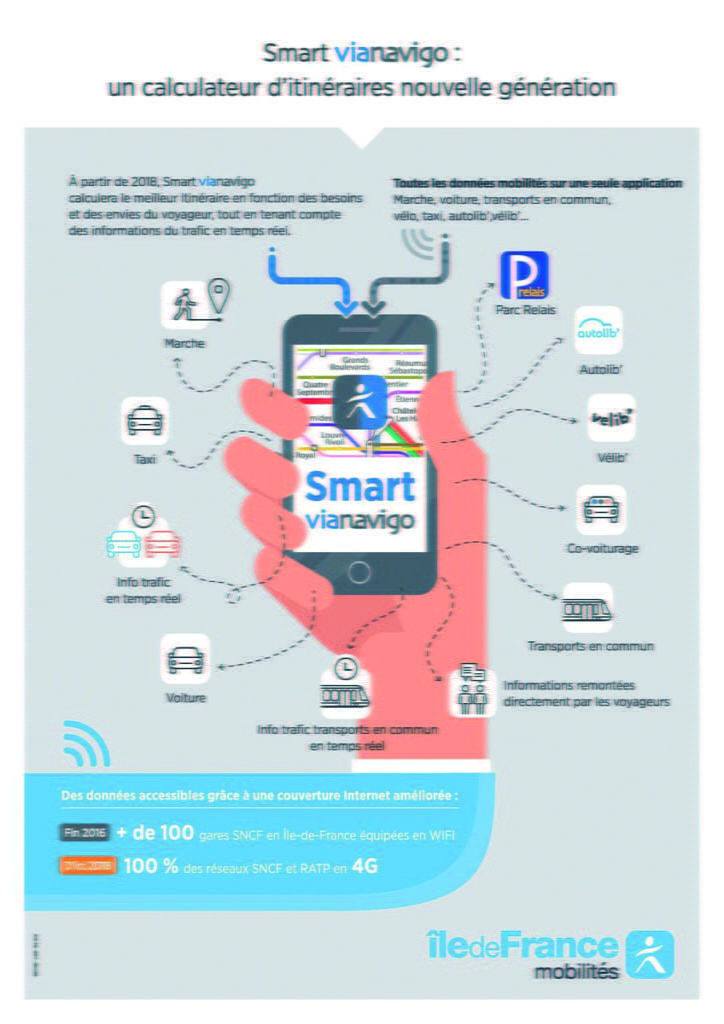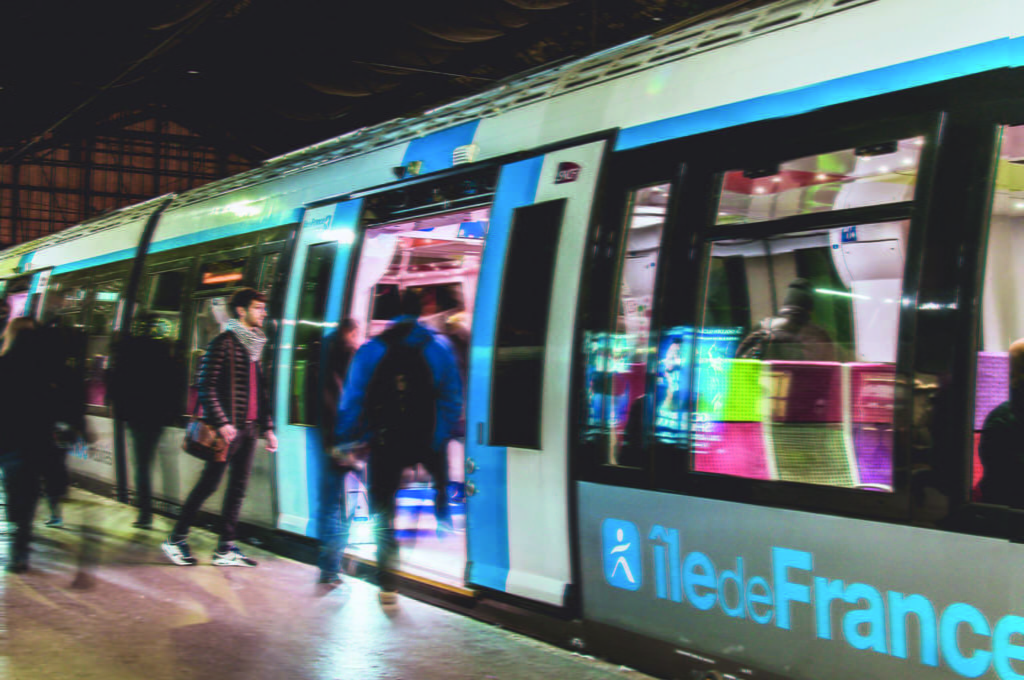Building excellence
Integrated mobility in the Paris Region, as told by Françoise Guaspare
 The project “Mobilité Intégrée pour l’Île-de-France” (or m2i – Integrated Mobility for Ile-deFrance) is an initiative dedicated to developing smart mobility solutions and addressing the need of travellers, public authorities and networks operators (road traffic as well as public transport). It is part of a global project promoting modal shift from individual car to public transport and other modes such as cycling and shared vehicles.
The project “Mobilité Intégrée pour l’Île-de-France” (or m2i – Integrated Mobility for Ile-deFrance) is an initiative dedicated to developing smart mobility solutions and addressing the need of travellers, public authorities and networks operators (road traffic as well as public transport). It is part of a global project promoting modal shift from individual car to public transport and other modes such as cycling and shared vehicles.
Firstly, the action relies on gathering various data on all modes (road traffic, public transport, shared bicycle and car service, car-pooling, parking lots, on-street parking) and on different time scales (PT timetables, real-time data, predictive data, historical data) under the umbrella of the public authority with a smart open data policy. Secondly, the data is processed using big data tools by private stakeholders. Today m2i has gathered 1 billion pieces of data every day. m2i will enrich Ile de France Mobilités’ data portal to build major mobility services in the world:
- For the travellers, m2i seeks to provide a multimodal GPS, to help users choosing the most appropriate transport mode, and support them while travelling.
- For the public authorities, m2i is developing a digital mobility observatory helping to set up strategies on a reliable diagnosis and to evaluate the public actions undertaken.
- For the network operators, m2i through the use of predictive data and mixing road traffic and PT data, is setting up a predictive networks management, to optimise their use.
This project received funding from the French government (PIA) and the European Commission under the 2016 Connecting Europe Facility (CEF) call to promote innovative transport technologies. The initiative will contribute to address a key traffic situation and to remove bottlenecks on the Paris Urban Node of the Trans-European Transport Network (TEN-T).
The 2011 Transport White Paper of the European Commission formulates ambitious urban mobility policy objectives, following on the established need to cut transport GHG emissions by 60 per cent compared to 1990. These include the full phasing out of conventionally fuelled vehicles in city centres by 2050 and close to zero-emission logistics in cities by 2030. Advancing new mobility systems and services, the available transport decarbonisation levers are the following: demand and land use management, modal shift, fuel substitution, and fuel/energy efficiency. New mobility service innovations have the potential to contribute to these levers to achieve overall decarbonisation targets. In line with the European Commission’s objectives, the m2i project aims to foster modal shift towards softer modes through a set of high-level traveller information services and can be for this reason considered as a milestone in multimodal travel information. m2i is a part of the digital action plan for Ile-de-France Mobilités, which is structured around seven components: 1) a multimodal assistant accessible to all (Vianavigo); 2) the use of open data; 3) the creation of a regional data and services platform; 4) the collection of new data; 5) connectivity; 6) modernisation of the ticketing systems; 7) innovation.
Coordinated by Ile-de-France Mobilités and Transdev and its IT subsidiary Cityway, m2i brings public and private sectors under the regional transport authority Ile-de-France Mobilités’ governance: public transport operators, road network operators, private services operators, car industry, IT industry.
Building a fair mobility infrastructure is one of the main challenges that the Ile-de-France region is facing. Mobility issues concern all citizens. While many alternatives to privately owned car are numerous in the city centre, this is not the case for rural or suburban areas. As in most European cities, in Île-de-France car occupancy rate for commuting is close to one single passenger. Moreover, more than half of car trips are less than 3km. There is tangible scope for reducing the modal share of solo cars, developing multimodality and pushing for a more sustainable and smarter mobility.

"m2i aims at providing information to the public at large on the whole range of mobility services in Ile-de-France region through the “Navigo” and “Vianavigo” brands, together with other brands well-known at the national and international levels"
CAR SHARING AS PART OF THE MOBILITY CHAIN
In addition to public transport and soft modes, the car can help to optimise travel in urban areas. Due to the latest developments of car sharing schemes, the shared cars can be considered as a valuable link in the mobility system. Moreover, thanks to digital technology, services are evolving to meet the expectations of the users, making it easier for them to travel. Information is becoming increasingly accurate and reliable, both in terms of readable and accessible offers and regarding public policies being assessed and optimized.
Today the travel information in Ile-de-France is fragmented and incomplete. This is mainly due to an excessive numbers of websites and mobile apps in Ile France. m2i aims at providing information to the public at large on the whole range of mobility services in Ile-de-France region through the “Navigo” and “Vianavigo” brands, together with other brands well-known at the national and international levels. The first step will include gathering mobility data sets on all modes, upgrading the data quality. Then, the project will develop and test a predictive multimodal navigator which will enhance mobility in Ile-deFrance and better serve the needs of the inhabitants of the region.
More specifically, the study and pilot action aim at integrating the whole mobility offer (public and private) and various smart mobility services that have been developed by start-ups and industrial stakeholders providing them with a unique portal. The consolidated predictive datasets, gathered thanks to the contribution of the users, will include information on public transport, road traffic, freight and parking. The resulting mobility data portal will be enriched in terms of coverage, depth, and quality, making it the most comprehensive mobility data portal for an Urban Node in the world.
Throughout the process, private sector actors will play a prominent role. Public-private partnerships are essential to building long-term partnerships with mobility data suppliers and building comprehensive data sets.
The efficient multimodal traveller information will benefit passengers, mobility operators and the Transport authority. In fact, the planner will offer a range of travel solutions based on real-time and predictive data. Integrating real-time carpooling and individual vehicles, passengers will have the possibility to opt for more multimodal or intermodal behaviour. Furthermore, the planner will also provide information on passenger comfort. Mobility operators will particularly benefit from an advanced transport network management tool, which will use 1-hour traffic forecasts for all modes. The data collected from the connected cars and buses will be used to regulate traffic in real time. It will significantly improve the road junction management and adapt the public transport services to the real needs of passengers, resulting in an increased reliability of travel times. Ile-de-France Mobilités, the Region’s transport authority, will rely on a digital observatory at the service of mobility policies. Intended to evaluate the flow of travel within a territory, the observatory will base its strength on databases compiling travels and travel time on all modes of transport. It will make it possible to know precisely the trending mobility behaviours, helping Ile-de-France Mobilités in the development of their mobility strategies and to evaluate their impacts.
This new project will have a real impact on mobility behaviour in Îlede-France region and will be replicable in cities and regions across Europe and beyond.
FYI
Françoise Guaspare is Senior Advisor at Île-deFrance’s EU Office
For more information:
Ile de France Mobility:
Olivier Vacheret, digital services head of unit, olivier.vacheret@iledefrance-mobilites.fr
Transdev: Jean Coldefy, project director, jean.coldefy@transdev.com
Cityway: Laurent Glorieux, lglorieux@cityway.fr
 Beautiful young woman travelling in a train of Parisian underground and looking through the window at the Eiffel tower
Beautiful young woman travelling in a train of Parisian underground and looking through the window at the Eiffel tower